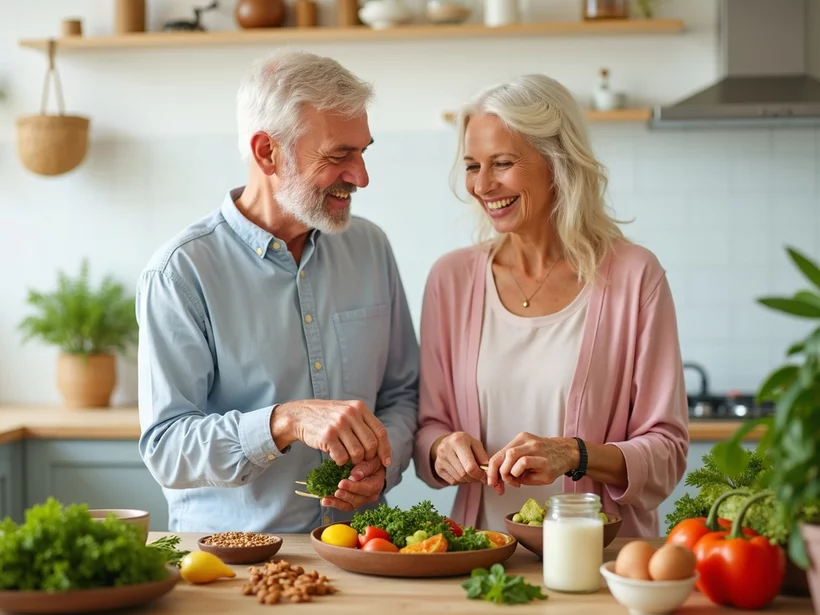Bone Health Tips for Seniors

Did you know that conditions like osteoporosis can lead to brittle bones, significantly impacting the quality of life for seniors? As we age, understanding how nutrition can strengthen bone health is crucial for maintaining independence and vitality.
What You Will Learn
- Calcium is essential for bone density; seniors should aim for around 1,200 mg daily from sources like dairy and leafy greens.
- Vitamin D enhances calcium absorption, and seniors can obtain it from sunlight and foods like fatty fish and fortified products.
- Magnesium, potassium, and vitamins K and C play significant roles in maintaining bone health and should be included through nuts, whole grains, and leafy vegetables.
- Protein is vital for muscle maintenance and overall health; seniors should include sources like fish, legumes, and nuts in their diets.
- Adopting whole food dietary patterns, particularly Mediterranean diets, supports bone health and overall vitality with rich nutrients.
- Hydration is crucial for nutrient absorption and overall health; seniors should ensure adequate fluid intake through water, herbal teas, and broths.
- Incorporating weight-bearing exercises, such as walking or resistance training, is essential for enhancing bone density.
- Addressing appetite loss by making meals visually appealing and offering frequent smaller meals can help seniors meet their nutritional needs.
Nutritional Essentials for Strong Bone Health in Seniors
Understanding the key nutrients that support bone health is vital for seniors. Here’s a concise overview of the essential vitamins and minerals along with their recommended daily intake and sources.
Calcium
Recommended: 1,200 mg per day
Sources: Dairy products, leafy greens, fortified foods
Vitamin D
Recommended: Adequate sun exposure and dietary sources
Sources: Fatty fish, fortified foods, egg yolks
Magnesium
Important for calcium metabolism
Sources: Nuts, seeds, whole grains
Protein
Recommended: Adequate intake for muscle maintenance
Sources: Fish, poultry, legumes
Vitamin K
Supports bone mineralization
Sources: Leafy greens
Vitamin C
Essential for collagen formation
Sources: Citrus fruits, strawberries
Nutritional Insights for Strengthening Bone Health in Seniors
As we age, maintaining our bone health becomes more crucial than ever. Did you know that conditions like osteoporosis can lead to brittle bones, making it easier to fracture them? At Cairns Active Ageing Solutions, we understand that ensuring strong bones is essential for living an active and independent life. This article will explore the vital role nutrition plays in supporting bone health for seniors, including tips for ensuring home safety for seniors to prevent falls that can exacerbate bone issues.
Understanding Bone Health: A Foundation for Seniors
Bone health is the foundation of our physical strength and mobility. With age, our bones naturally lose density, which can lead to various complications. The risk of fractures increases significantly, often leading to a loss of independence. Therefore, focusing on bone health is not just about avoiding pain; it's about maintaining quality of life.
Many seniors may not realize that bone density can be influenced by diet and lifestyle choices. Being proactive about nutrition can prevent conditions like osteoporosis. So, let’s dive into the essential nutrients that can help strengthen those bones!
Key Nutrients Essential for Bone Strength
Calcium: The Cornerstone of Bone Health
Calcium is often referred to as the cornerstone of bone health. It is crucial for maintaining bone density and strength. For seniors, it’s recommended to aim for about 1,200 mg of calcium per day. Great sources of calcium include:
- Dairy products like milk, cheese, and yogurt
- Leafy greens such as kale and collard greens
- Fortified foods like certain cereals and plant-based milk
Incorporating these foods into daily meals can make a significant difference in your bone health. Are you enjoying your favorite cheese or leafy greens today?
Vitamin D: Enhancing Calcium Absorption
While calcium is essential, it needs a helper—enter Vitamin D. This nutrient enhances calcium absorption, making it vital for bones. Many seniors may not get enough sun exposure to generate adequate vitamin D, especially in the cooler months. Excellent sources of vitamin D include:
- Fatty fish such as salmon and mackerel
- Fortified foods like orange juice and dairy
- Egg yolks
Getting outside for some sunlight is equally important! A little sun can go a long way in keeping our bones strong. Have you soaked up some rays today?
Magnesium and Other Micronutrients: The Unsung Heroes of Bone Health
Let’s not overlook other crucial nutrients like magnesium, potassium, and vitamins K and C. These micronutrients play vital roles in maintaining bone density. For instance, magnesium helps with calcium metabolism and can be found in foods like:
- Nuts and seeds
- Whole grains
- Dark chocolate
Additionally, vitamin K is found in leafy greens and helps with bone mineralization. Let’s not forget about vitamin C, which is essential for collagen formation. Together, these micronutrients create a strong foundation for our bones! For more insights into maintaining mobility and preventing common issues, consider exploring resources on preventing falls in the elderly.
Protein: Building Blocks for Healthy Bones
Finally, don’t underestimate the power of protein! It’s essential for muscle maintenance, which is important for supporting our bones. Seniors should aim for adequate protein intake, with sources including:
- Fish and poultry
- Legumes and tofu
- Nuts and seeds
Including these protein-rich foods in your diet can help maintain not only strong bones but also overall health. Have you had your favorite protein source today?
Practical Dietary Patterns for Seniors
Choosing the right foods is just the beginning. Consuming a variety of whole foods is crucial for optimal nutrition. At Cairns Active Ageing Solutions, we advocate for balanced dietary patterns over isolated supplements. This is where Mediterranean and balanced diets shine!
Adopting Whole Food Diets for Optimal Nutrition
Whole food diets offer many benefits for seniors. Here are some highlights:
- Rich in fruits and vegetables for antioxidants
- Whole grains for fiber and nutrients
- Healthy fats from sources like olive oil and nuts
These types of diets not only support bone health but also promote overall vitality and well-being. Why not give it a try?
Sample Meal Plans and Food Lists for Seniors
Practical meal ideas can make it easier to meet your nutritional needs. Here’s a simple meal plan to get you started:
- Breakfast: Greek yogurt with berries and a sprinkle of nuts
- Lunch: Spinach salad with grilled chicken and avocado
- Dinner: Baked salmon with quinoa and steamed broccoli
- Snacks: Hummus with carrot sticks or a piece of fruit
Feel free to mix and match these ideas based on your preferences! Eating nutritious meals can be delicious and satisfying!
Addressing Age-Specific Challenges
As we age, we may face challenges like reduced appetite or malnutrition. It’s essential to recognize these barriers and find ways to overcome them. At Cairns Active Ageing Solutions, I’ve seen how small adjustments can make a big difference.
Overcoming Appetite Loss and Malnutrition
To combat appetite loss, consider these strategies:
- Make meals visually appealing to stimulate interest
- Offer smaller, more frequent meals instead of larger ones
- Incorporate hydration with soups and smoothies
These tips can help promote healthy eating habits and ensure that seniors get the nutrients they need!
Safe Protein Intake and Acid Load Considerations
It’s also crucial to ensure safe protein intake while considering acid load. Here are some guidelines:
- Choose lean protein sources
- Avoid excessive intake of red and processed meats
- Incorporate more plant-based proteins
Balancing protein intake can significantly impact bone health, so it's essential to keep track!
Hydration: A Vital Component of Bone Health
Hydration is often overlooked, yet it plays a vital role in bone health. Staying hydrated supports overall bodily functions, including nutrient absorption. Seniors should aim for adequate fluid intake, which can include:
- Water, of course!
- Caffeinated beverages in moderation
- Herbal teas and broths
Remember, hydration supports not just your bones but your entire body!
Incorporating Exercise and Lifestyle Changes for Bone Health
While nutrition is vital, exercise also plays a significant role in bone health. By incorporating weight-bearing activities, seniors can enhance bone density and overall health. Some effective exercises include:
- Walking or light jogging
- Resistance training
- Yoga or tai chi for balance
Additionally, it’s important to consider the impact of smoking and alcohol on bone health. Reducing these can greatly improve your overall well-being. Have you thought about ways to stay active? For more information on maintaining an active lifestyle, check out resources on physical activity benefits for seniors.
Quick Summary
Here's a brief recap of the key points discussed so far:
- Calcium is crucial for maintaining bone density, with recommended daily intake for seniors at about 1,200 mg.
- Vitamin D enhances calcium absorption; sources include fatty fish and fortified foods.
- Magnesium, potassium, and vitamins K and C also play vital roles in bone health.
- A balanced diet rich in whole foods and adequate hydration is essential for overall well-being.
Frequently Asked Questions (FAQs)
Summarizing Nutritional Strategies for Stronger Bones
As we wrap up our discussion on enhancing bone health, it's vital to remember the key nutrients that play a significant role in our well-being. For seniors, incorporating calcium, vitamin D, magnesium, and protein into the diet is essential. These nutrients support not only bone density but overall health, making a positive impact on daily living.
So, what are the best dietary patterns to embrace? Whole foods, especially those found in the Mediterranean diet, offer delicious options rich in the nutrients we need. Whole grains, leafy greens, lean proteins, and healthy fats are all part of a strategy that goes beyond supplements!
- Prioritize calcium-rich foods like dairy, leafy greens, and fortified products.
- Ensure adequate vitamin D through sunlight exposure and dietary sources.
- Include high-protein foods such as fish, nuts, and legumes.
Interactive Tools and Resources for Ongoing Support
To help reinforce the dietary choices that support bone health, I encourage you to utilize various interactive tools. Checklists, infographics, and meal planning guides can make it easier and even enjoyable to implement these nutritional strategies. At Cairns Active Ageing Solutions, we’re committed to providing resources that empower seniors to take charge of their health!
Here are some resources you might find helpful:
- Nutrition checklists to track key nutrient intake.
- Infographics that illustrate food sources rich in essential nutrients.
- Sample meal plans that cater to different dietary preferences.
Encouraging Healthy Eating Habits among Seniors
It's time for us to take action! Whether you’re a caregiver or a senior looking to boost your health, implementing these nutritional tips can foster better bone health. We can make a difference through small, consistent changes in our eating habits. Have you tried adding a new vegetable to your meals or exploring a new recipe? Every bit counts!
Here are some tips to encourage healthy eating habits:
- Experiment with new recipes that highlight nutrient-rich foods.
- Share meals with family or friends to make it a social event.
- Stay curious about nutrition by learning more about the foods you eat.
The Importance of Education and Community Programs
Lastly, let’s not forget the role of education and community programs in promoting awareness about senior nutrition. Health professionals, health screenings, and local community initiatives can significantly enhance knowledge and preventive care. At Cairns Active Ageing Solutions, we believe that access to information and support is key to thriving in our golden years! Remember, these efforts, combined with strategies for preventing falls for Cairns seniors, create a comprehensive approach to health.
By staying informed and participating in community resources, seniors can take proactive steps toward better health. I encourage everyone to reach out to local programs or services that focus on nutrition and wellness. Together, we can build a supportive network that empowers our seniors to live healthier, more active lives! For additional advice on successful aging, consider reading about staying independent with active aging.
Recap of Key Points
Here is a quick recap of the important points discussed in the article:
- Prioritize calcium-rich foods such as dairy, leafy greens, and fortified products to maintain bone density.
- Ensure adequate vitamin D intake through sunlight exposure and dietary sources like fatty fish and fortified foods.
- Incorporate protein sources, including fish, legumes, and nuts, to support muscle and bone health.
- Adopt a whole food diet, focusing on fruits, vegetables, whole grains, and healthy fats for overall vitality.
- Stay hydrated to aid in nutrient absorption and support overall bodily functions.
- Engage in weight-bearing exercises to enhance bone density and maintain mobility.
- Consider community programs and resources to stay informed about nutrition and health initiatives tailored for seniors.









